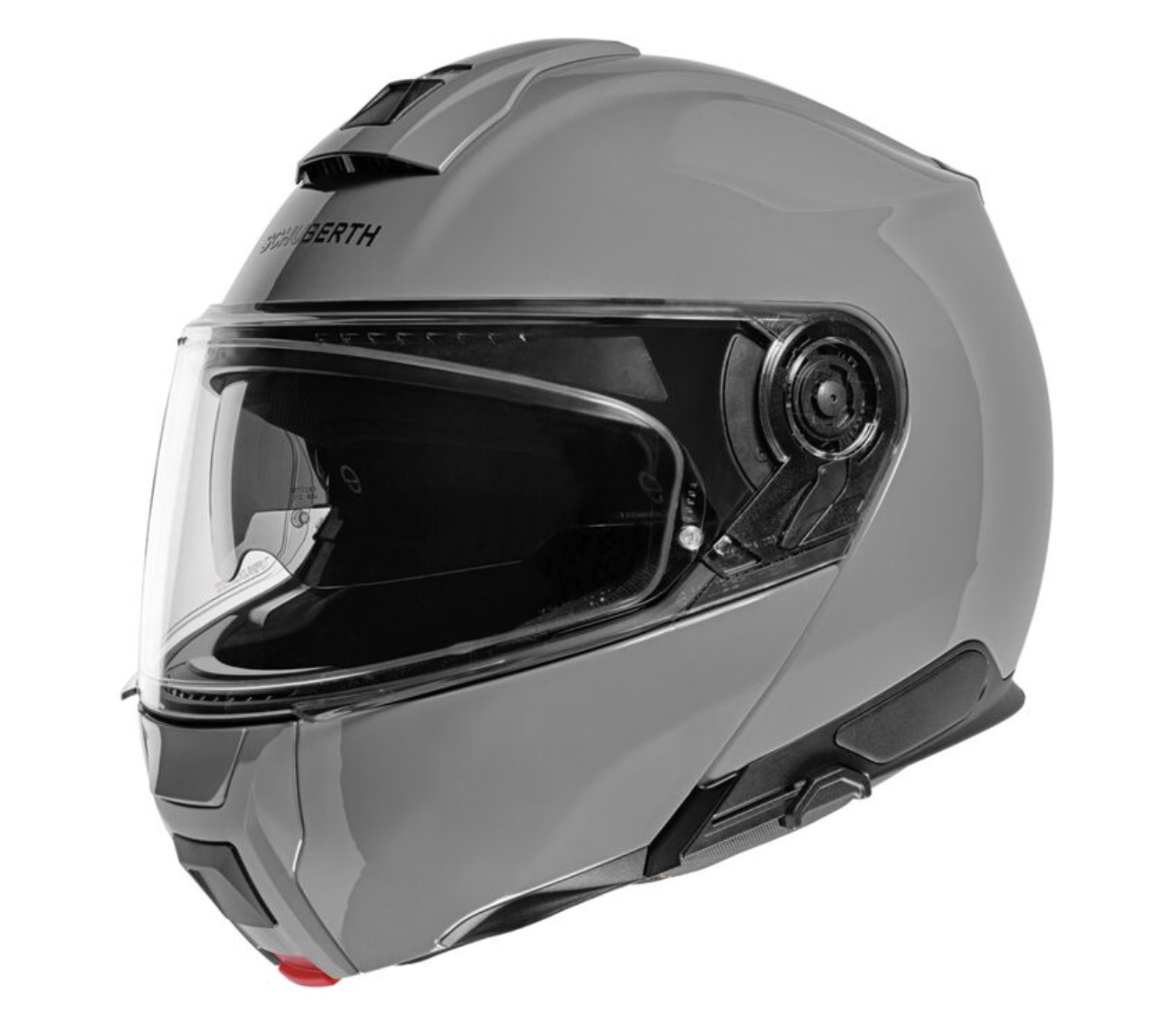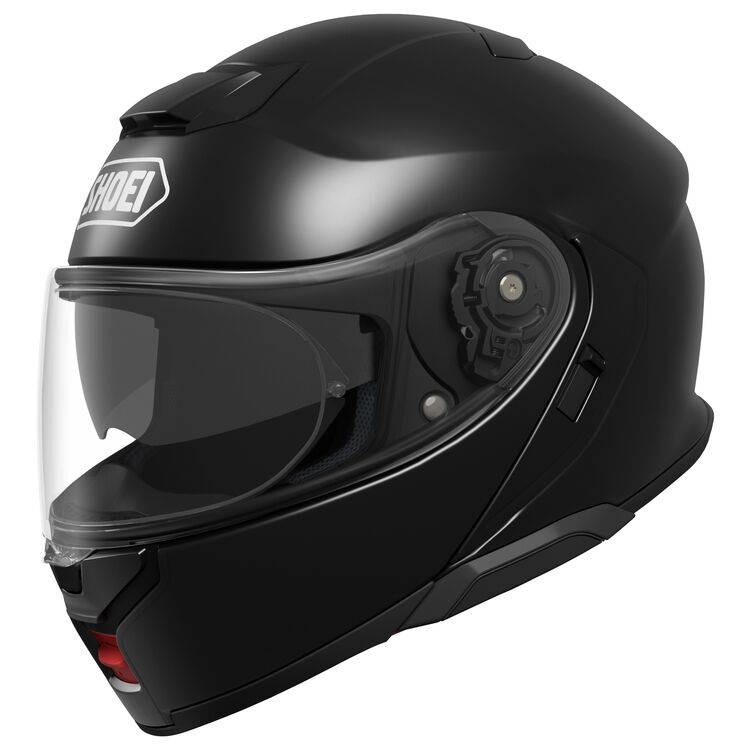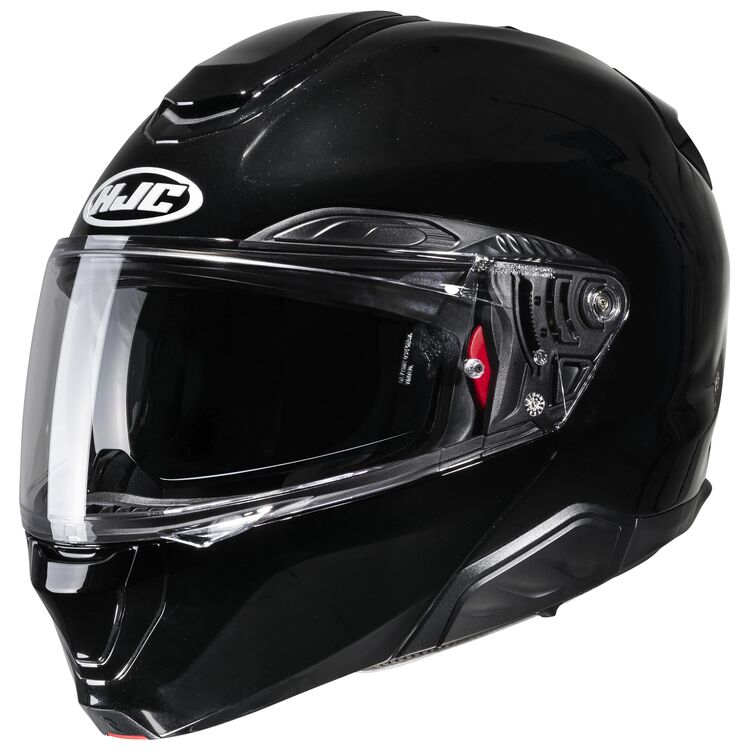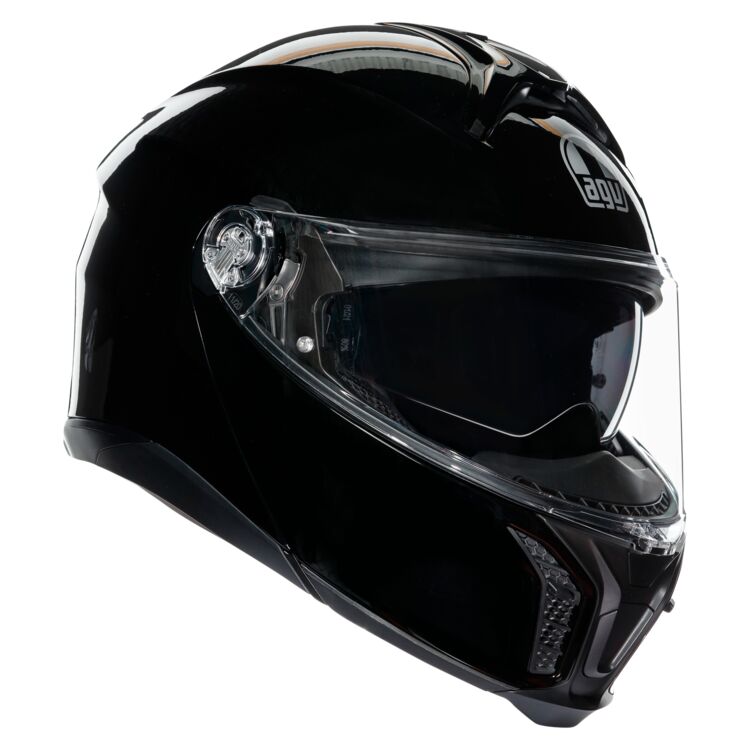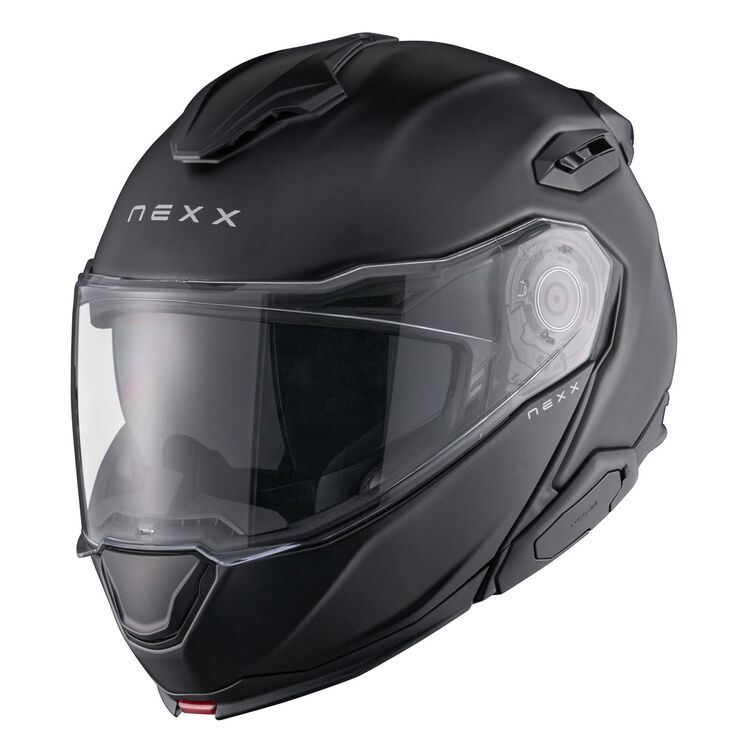
Schuberth C5 vs Shoei Neotec 3: Best for Touring & Commuting?
left for contents
If you’re in the market for a premium modular helmet, chances are these two names have already popped up: Schuberth C5 and Shoei Neotec 3. Both are flip-front designs, both meet the latest ECE 22.06 safety standard, and both cost a pretty penny. But here’s the question every rider ends up asking: is the Schuberth really worth the extra $100–150 over the Shoei?
Let’s dig into noise, comfort, ventilation, and day-to-day practicality—because at the end of the day, that’s what really matters when you’re touring or commuting.
If you just want the quick takeaway before we dive into the details, here’s how the Schuberth C5 and Shoei Neotec 3 stack up at a glance.
Quick Verdict: Who Each Helmet Suits Best
Buy the Schuberth C5 if…
- Highway quietness is your #1 priority.
- You want the cleanest comms integration with the SC2.
- You live somewhere cooler or wetter and like the snug seal.
The quietest touring helmet money can buy, kitted out with all the features you expect for those long days in the saddle.
- Modular flip up chin bar
- Drop down sun visor
- Space for integrated comms unit
- Many colorway options
- DOT certified, with ECE in EU
Buy the Shoei Neotec 3 if…
- You ride in hot weather and want better airflow.
- You prefer a lighter, more forgiving fit.
- You value easy sun-visor and flip-up operation.
A premium modular helmet built for long-distance comfort and low noise, with a smooth flip-up chin bar, tightly-sealing visor and wide drop down sun shade. Fits the SRL3 Sena comms system seamlessly.
- Comfortable wear all day
- Quiet, aerodynamic performance
- Flip-front convenience at stops
- Integrated comms & sun visor
- Faceshield lock is sometimes stiff
- Heavier weight may fatigue neck on long rides
The Schuberth C5 is worth about +$100–150 if you care most about low noise and seamless comms, but the Shoei Neotec 3 makes more sense for riders who prioritize ventilation and everyday usability.
Spec Sheet Showdown: Numbers That Matter
| Specs | Schuberth C5 | Shoei Neotec 3 |
|---|---|---|
| Weight | ~1,640 g (M) | ~1,600 g (M) |
| Fit/Shape | Intermediate oval, snug | Intermediate oval, more relaxed |
| Shell/Materials | Fiberglass + carbon reinforcement | AIM composite (fiberglass + organic fibers) |
| Safety/Cert | ECE 22.06, DOT | ECE 22.06, DOT |
| Ventilation | Dual top + chin vents, spoiler exhaust | Enlarged chin + brow/top vents |
| Comms Ready | Schuberth SC2 plug-in | Sena SRL-Mesh 2.0 ready |
| Warranty | 5 years (with registration) | 5 years (with registration) |
| Street Price (as of Sept 2025) | $799–849 | $699–749 |
Not sure either of these is the right fit? You can see how both helmets rank alongside other premium flip-fronts in our best modular helmets roundup.
Which Helmet Fits Your Ride?
Choose the Schuberth C5 if…
- You log serious highway miles and want the quietest shell possible.
- You’re planning to install the SC2 and like OEM-level integration.
- You live somewhere with unpredictable weather where a snug seal pays off.
- You want a plush, insulated fit over breezy ventilation.
- You’re the kind of rider who values small details like visor sealing and premium liner fabrics.
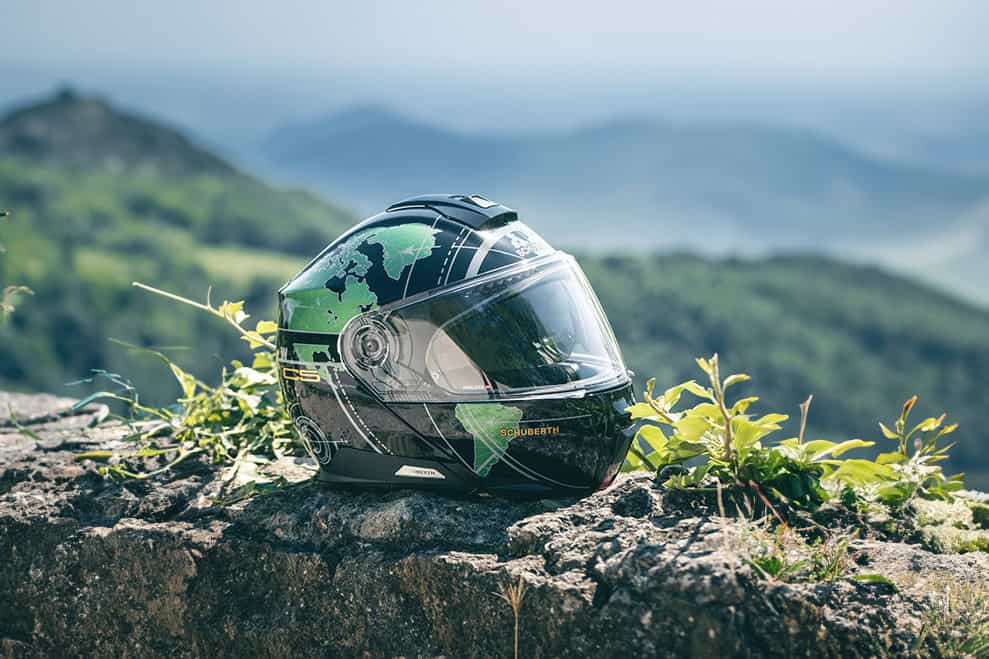
Choose the Shoei Neotec 3 if…
- You often commute in hot weather and need strong ventilation.
- You want a helmet that feels lighter and easier on your neck.
- You wear glasses and appreciate a smooth flip-up mechanism.
- You like a forgiving fit that adapts to more head shapes.
- You want quick, intuitive visor/sun-shield adjustments.
- You prefer broad dealer support for spares and fitting services.
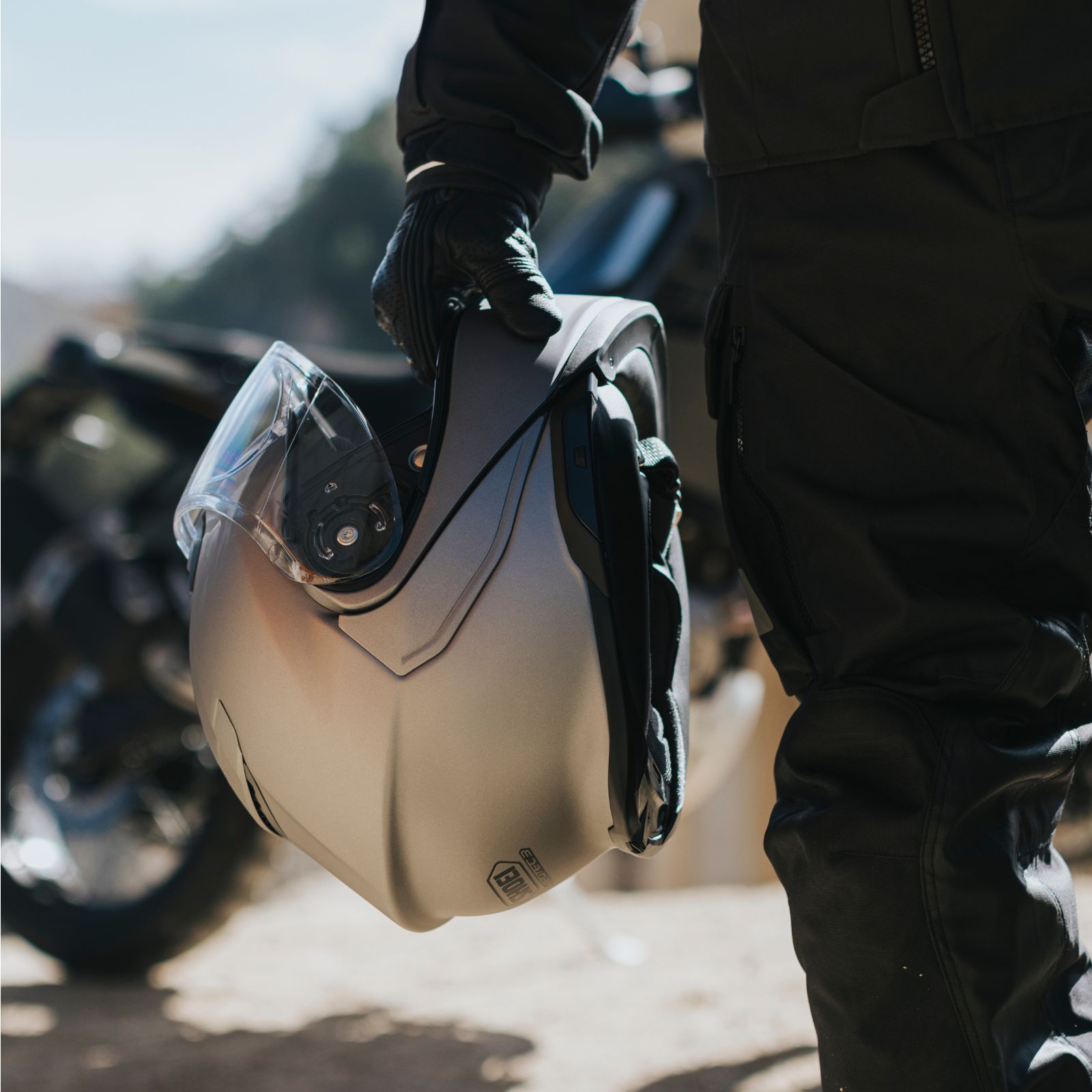
What Riders Are Saying on the Road
Schuberth C5
Owners consistently mention how quiet it is—arguably the quietest modular currently available. The thick neck roll and tight seal are praised for reducing fatigue on long highway days. Fit is snug, especially around the cheeks, and some riders note it takes a few rides to break in. The SC2 comms system gets high marks for its invisible integration. Downsides? Ventilation is “fine” but nothing to brag about in summer.
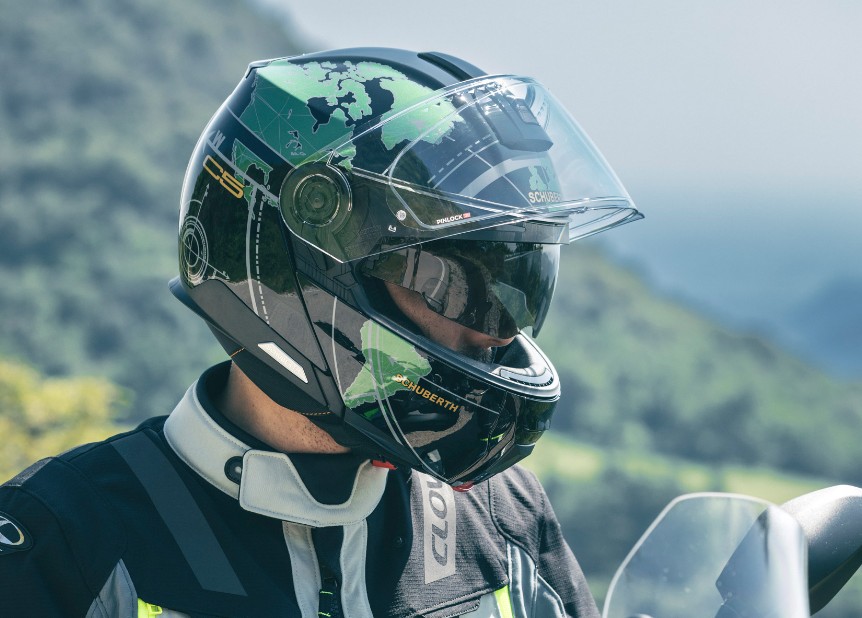
For a closer look at build quality, comfort, and how the C5 performs in daily use, see our in-depth Schuberth C5 review.
Shoei Neotec 3
Comfort and usability come up again and again. The flip mechanism is smooth, the sun visor slides down with little effort, and the helmet works well with glasses. Riders appreciate the improved top vents compared to the Neotec 2, especially for commuting in heat. Noise control is very good, but at 70+ mph it’s not as hushed as the Schuberth.
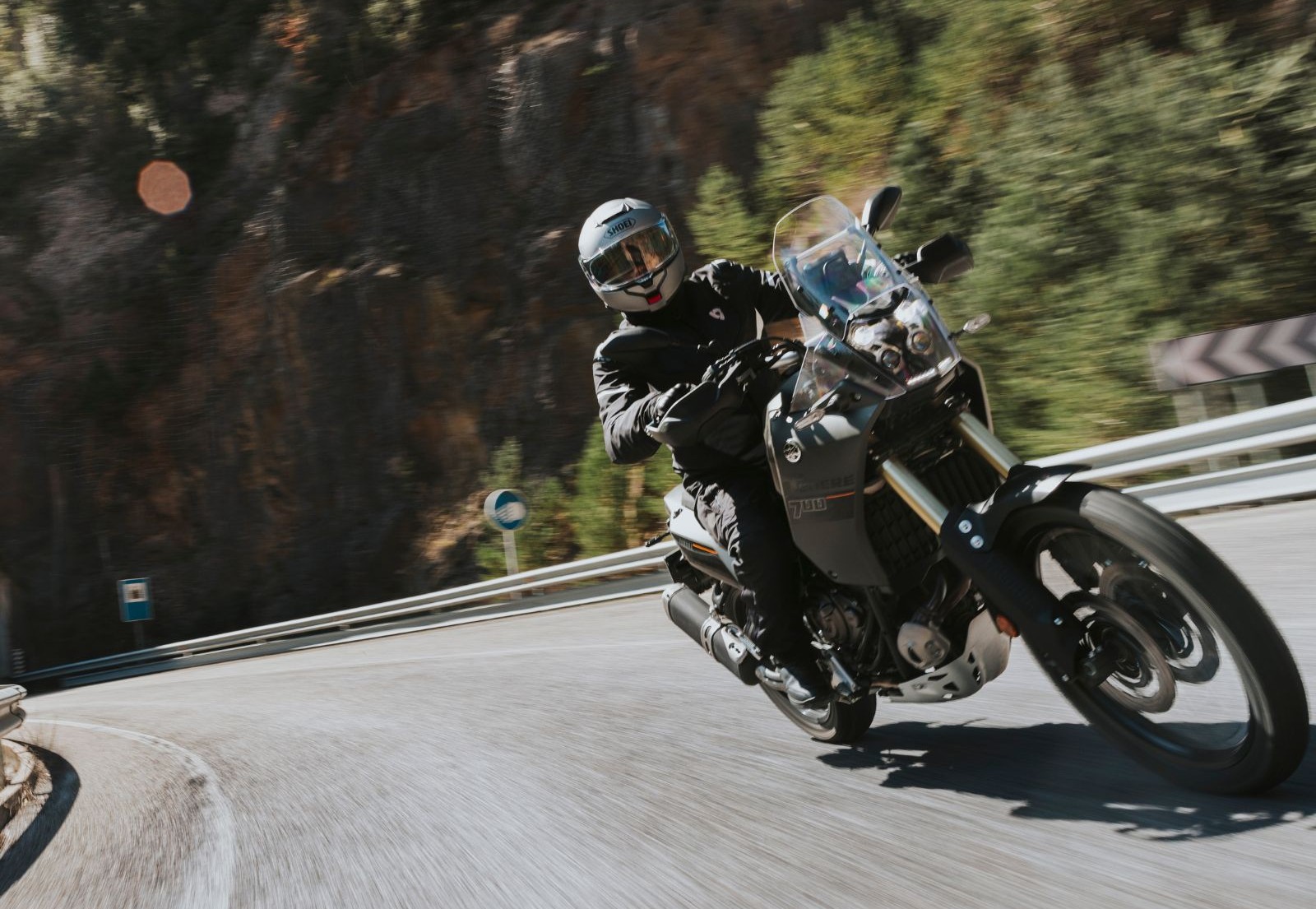
If you’d like the full breakdown of rider impressions and long-term comfort, check out our detailed Shoei Neotec 3 review.
Face-Off: How They Compare Where It Counts
Noise at Highway Speeds
If your rides involve long stretches of highway, this is where the Schuberth C5 earns its reputation. The dense neck roll, aerodynamic shell, and visor sealing combine to make it one of the quietest helmets you can buy.

Shoei’s Neotec 3 is no slouch—plenty of riders find it perfectly quiet up to 65–70 mph—but once you start pushing higher speeds, a faint hiss creeps in.
For all-day touring, the C5 is the calmer environment.
Weight & Fatigue
On paper, the two weigh almost the same, hovering around 1.6 kg. But on your head, the Shoei feels lighter thanks to its balance and shell design. The C5 has a more planted, insulated feel—some call it reassuring, others find it a bit heavy over time. If you ride long hours day after day, the Neotec 3 may feel easier on your neck.
Ventilation in Heat
Here’s where Shoei pulls ahead. The Neotec 3’s enlarged chin and top vents actually push a noticeable stream of air, making it a much better companion for summer commuting.
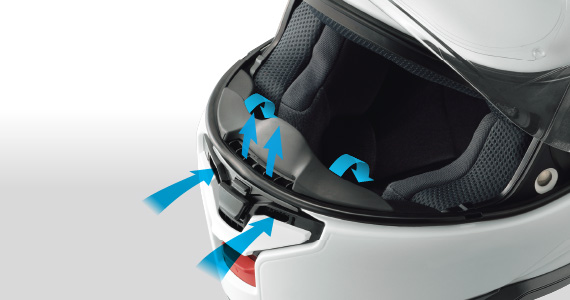
Schuberth’s C5 keeps things controlled—enough airflow to stay comfortable, but the tradeoff is noise reduction.
If you’re a rider in Arizona or Southeast Asia, you’ll appreciate Shoei’s breeze. If you’re in Northern Europe or the Pacific Northwest, Schuberth’s balance makes sense.
Visor & Sun Shield Usability
Both have drop-down sun visors, but Shoei’s slider is smoother and more intuitive, especially with gloves on. The main visor on the C5 locks down with a solid, reassuring seal—great for wet weather. Shoei’s visor is easier to operate but has a slightly looser feel when closed. In practice, Shoei is friendlier for daily commutes, while Schuberth shines on longer, wetter tours.
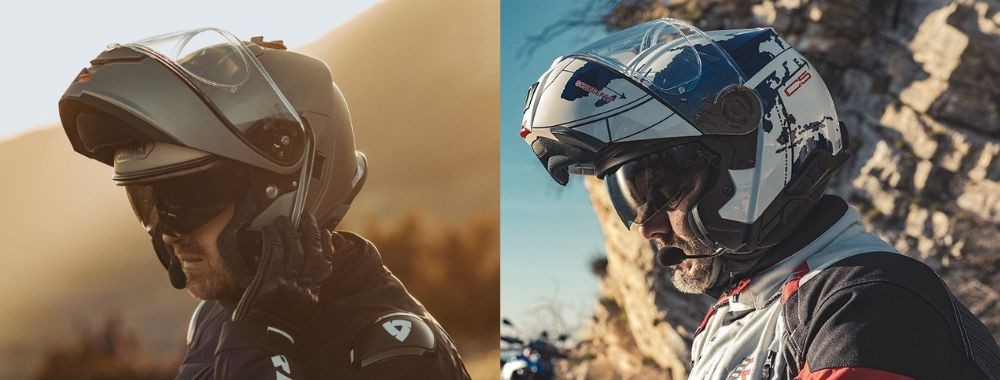
Comms-Ready Fitment
Schuberth designed the C5 around the SC2 system. Slots for the battery, speakers, and microphone are built in, making it look almost invisible once installed.
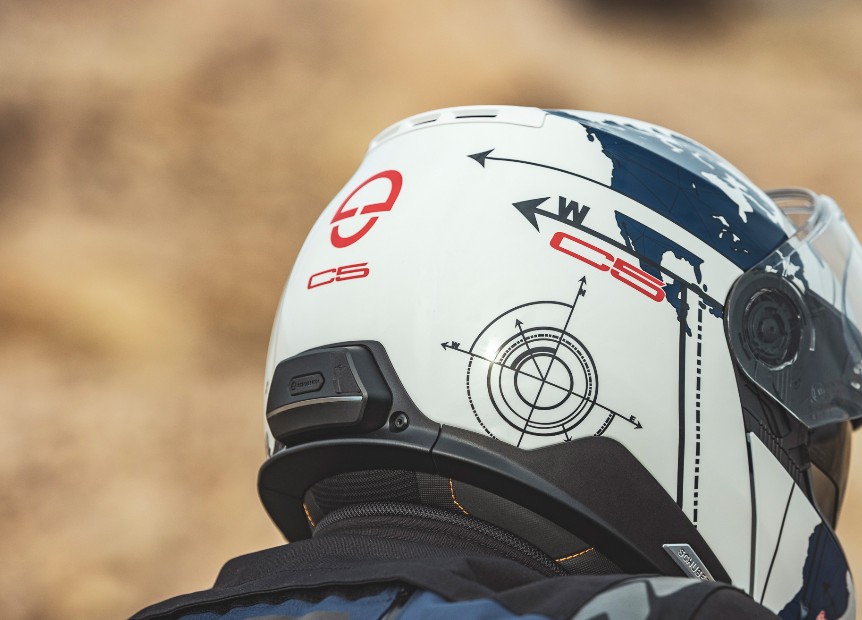
Shoei works with Sena’s SRL-Mesh kit, which fits well but is still a bit more noticeable.
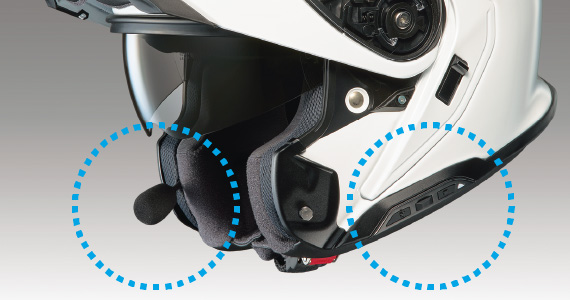
If stealth integration matters, Schuberth takes this round.
Build & Finish
Both helmets feel premium. The C5 leans toward a “luxury touring” vibe with plush liners, thicker padding, and refined paintwork. Shoei feels durable, practical, and perhaps a touch sportier. It comes down to whether you want plush refinement (C5) or rider-friendly practicality (Neotec 3).
Is the Extra $100 Really Worth It?
Street prices put the Shoei Neotec 3 at $699–749 and the Schuberth C5 at $799–849. That’s a difference of roughly $100–150.
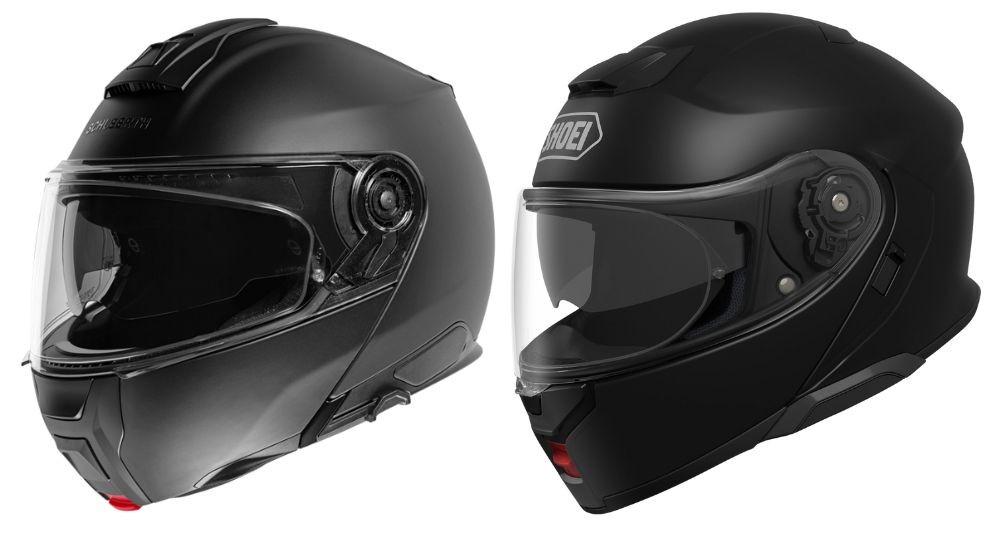
What does that premium actually buy you?
- A quieter ride at highway speeds.
- A visor that seals more tightly in the rain.
- The cleanest comms integration available on any modular.
For many riders, the Neotec 3 delivers 90% of what the C5 offers at a lower price—and it actually beats the C5 on ventilation. But if you’re sensitive to wind noise, spend hours at highway pace, or just want a helmet that feels more “buttoned-down” on tour, the Schuberth earns its premium.
Other Helmets Worth a Look
HJC RPHA 91 – A strong value play. Not quite as quiet as the C5 or Neotec 3, but comfortable and nearly $200 cheaper.
A premium DOT-rated modular helmet combining composite‑shell strength with a smooth flip‑front, quiet ride and adjustable sun visor for long-distance touring comfort.
- Composite PIM Evo shell offers superior impact protection
- Adjustable drop-down sun visor adapts to changing light
- Very quiet for a modular helmet—~96 dB at highway speeds
- Comfortable, plush liner with interchangeable cheek pads
- Slightly heavy compared to lighter modulars
- Chin bar lock can be finicky to operate with gloves
If you’re curious how the C5 stacks up against the HJC RPHA 91, we’ve also broken it down in this article here.
AGV Tourmodular – Sportier fit and lighter feel. Great for riders mixing sport-touring with commuting.
A premium modular helmet built for safety comfort and long-distance touring
- Lightweight carbon-aramid-fiberglass shell
- Wide 190° field of view enhances awareness
- Smooth, secure chin-bar flip-up mechanism
- Excellent ventilation and fog-resistant shield
- Eyeglass-friendly interior channels
- P/J lock hard to operate with gloves on
- Replacement cheek pads require tools before removal
Nexx X.LifeTour – Praised for its strong ventilation, sunshield, and solid construction, the Nexx X.LifeTour is a value-packed modular without sacrificing key touring features.
Modular helmet tailored for tough touring: wide visibility, effective airflow, and eyewear-ready comfort—delivers reliable protection and convenience for long rides.
- Panoramic eye port for expanded field of vision
- Internal sun visor deploys quickly and smoothly
- Strong ventilation via multiple vents and channels
- Glasses-compatible liner with wicking fabric
- Comms-ready with X-COM speaker pockets
- Heavier than some competitors (~1930 g)
- Chin-bar lock can feel loose when open
Frequently Asked Questions
Which helmet is quieter, really?
The C5. Riders repeatedly mention it’s among the quietest modulars on the market, especially above 70 mph.

Which one is better for hot climates?
The Neotec 3. Its improved vents make it noticeably cooler in summer traffic.
Can I wear glasses with both helmets?
Yes, but the Neotec 3 is easier on glasses wearers because of its smoother flip mechanism.
Do both helmets meet the latest safety standards?
Yes—both are certified to ECE 22.06 and DOT for North America.
How do the comms systems compare?
The Schuberth SC2 is almost invisible once installed. The Shoei works with Sena SRL-Mesh, which fits well but is more visible.
Which feels heavier on the head?
The weights are similar, but the Schuberth feels more solid and snug. Shoei feels a touch lighter thanks to its balance.
Which one is better in rain?
The Schuberth. Its visor seals tighter and the helmet feels more insulated overall.
Which one is easier to live with day-to-day?
The Shoei. Its mechanisms, ventilation, and fit are simply friendlier for regular commuting.
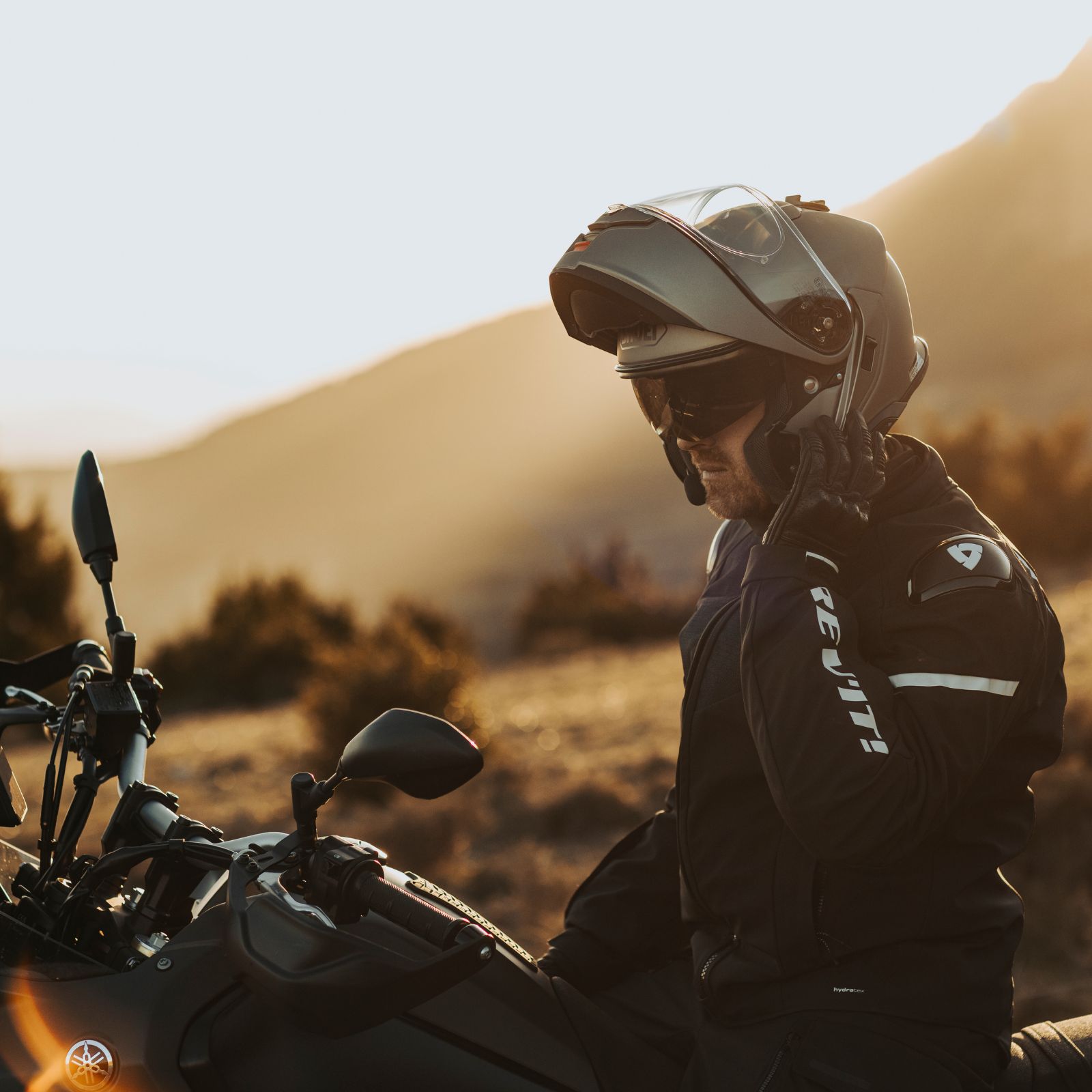
Not sure your comms unit will fit?
Sometimes the perfect helmet comes with a catch—it’s designed around a specific Bluetooth unit. That can make it tough if you prefer something different. With an adapter from Tubs Jackson, you can get a factory fit for any comms units on helmets you actually want to ride in.
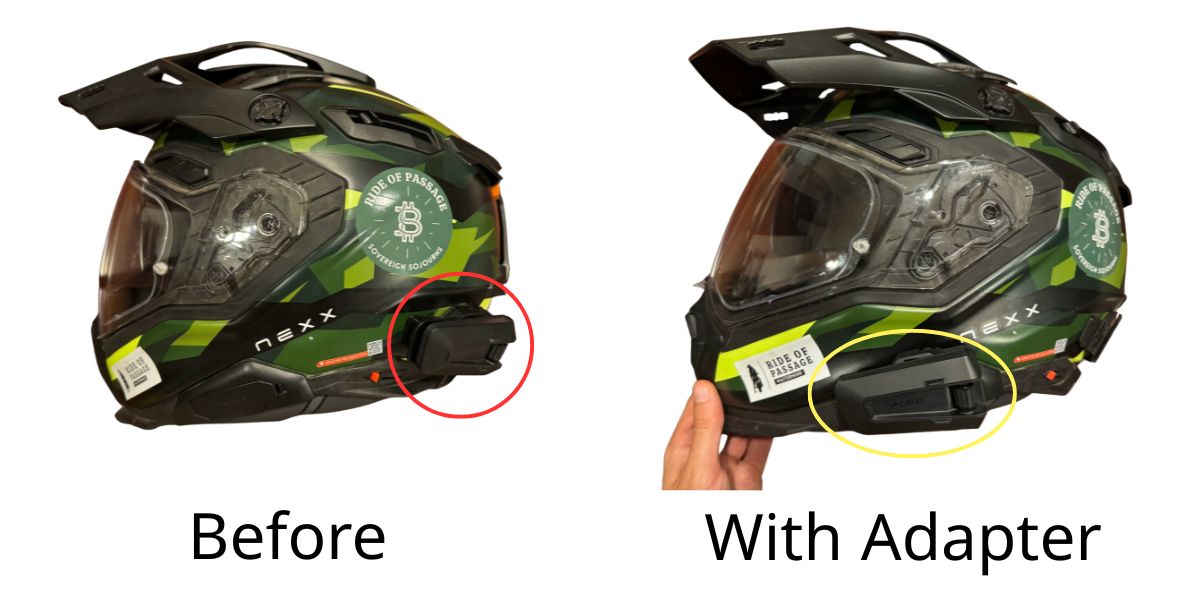
Tubs Jackson is a weird name, I know, but I have their adapter in my Nexx X.WED3 helmet and it’s rock solid. Much nicer than reaching way back to where I had the sticky mount before. I wish I’d thought of this idea.
Tip: Get FREE SHIPPING just by buying here or using code BETTERONTHEROAD at checkout.
Closing Thoughts
So—Schuberth C5 or Shoei Neotec 3? Here’s the simplest way to put it: if your life is full of long highway miles, cold mornings, and hours in the saddle, the Schuberth is the helmet that keeps things quiet and composed. If your reality is daily commuting, hot traffic, and weekend rides, the Shoei is the helmet that feels easier to live with.
Both are excellent choices, and you won’t regret either. But knowing your riding environment—and your tolerance for noise vs heat—will make the decision clear. At the end of the day, you’re not just buying a helmet. You’re buying comfort for every mile you’ll ride.
The quietest touring helmet money can buy, kitted out with all the features you expect for those long days in the saddle. | A premium modular helmet built for long-distance comfort and low noise, with a versatile flip-up chin bar, wide sun visor, and integrated speaker pockets for seamless comms. |
|
|
|
|
The quietest touring helmet money can buy, kitted out with all the features you expect for those long days in the saddle.
- Modular flip up chin bar
- Drop down sun visor
- Space for integrated comms unit
- Many colorway options
- DOT certified, with ECE in EU
- Ventilation is adequate but not outstanding in hot weather
- Snug fit can feel tight until the padding breaks in
A premium modular helmet built for long-distance comfort and low noise, with a versatile flip-up chin bar, wide sun visor, and integrated speaker pockets for seamless comms.
- Comfortable wear all day
- Quiet, aerodynamic performance
- Flip-front convenience at stops
- Integrated comms & sun visor
- Faceshield lock is sometimes stiff
- Heavier weight may fatigue neck on long rides
Related

Carbon Fiber Modular Helmets: Ultimate Flip-Up Lids
Discover carbon fiber modular helmets that deliver flip-up convenience, lightweight strength, and serious protection for every ride.

